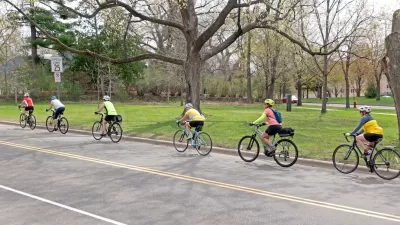A case study of suburban poverty and the programs needed to help residents through tough times.
Jessie Van Berkel reports on the persisting need for free meal programs in the suburbs of the Twin Cities region—despite the improving economy.
To illustrate the scope of the challenge Van Berkel cites the following statistics: "The number of children receiving free and reduced lunch last year had increased 35 percent, on average, in large suburban school districts since the height of the recession during the 2008-2009 school year, Minnesota Department of Education data show. Public schools in St. Paul and Minneapolis saw respective increases of 1 percent and 5 percent postrecession."
That comparison to schools in the region's inner cities ties to a larger point about the suburbanization of poverty, which is emerging as a trend in regions all over the country, including the Twin Cities. One of the challenges inherent to suburban poverty is how it can remind "out of sight and out of mind." Van Berkel quotes Anika Rychner, director of self-sufficiency at 360 Communities, a nonprofit primarily serving Dakota County, to explain how this dynamic plays out in suburban communities: "You could live in the community and never have to look at and acknowledge the need….Poverty doesn't look the same in the suburbs, but it's definitely here."
The article includes special attention to the efforts of Loaves and Fishes—a non-profit that has opened six new suburban dining site in the metro area in the past two years.
FULL STORY: Free meal program expands with the 'suburbanization of poverty'

Planetizen Federal Action Tracker
A weekly monitor of how Trump’s orders and actions are impacting planners and planning in America.

Vehicle-related Deaths Drop 29% in Richmond, VA
The seventh year of the city's Vision Zero strategy also cut the number of people killed in alcohol-related crashes by half.

Can We Please Give Communities the Design They Deserve?
Often an afterthought, graphic design impacts everything from how we navigate a city to how we feel about it. One designer argues: the people deserve better.

Southern Californians Survey Trees for Destructive Oak Pest
Hundreds of volunteers across five counties participated in the first Goldspotted Oak Borer Blitz, surveying oak trees for signs of the invasive beetle and contributing valuable data to help protect Southern California’s native woodlands.

Opinion: How Geothermal HVAC Lowers Costs, Improves Grid Resilience
Geothermal heating and cooling systems can reduce energy costs and dramatically improve efficiency.

Tenant Screening: A Billion-Dollar Industry with Little Oversight. What’s Being Done to Protect Renters?
Reports show that the data tenant screening companies use is often riddled with errors and relies on information that has no bearing on whether someone will be a good tenant.
Urban Design for Planners 1: Software Tools
This six-course series explores essential urban design concepts using open source software and equips planners with the tools they need to participate fully in the urban design process.
Planning for Universal Design
Learn the tools for implementing Universal Design in planning regulations.
Borough of Carlisle
Smith Gee Studio
City of Camden Redevelopment Agency
City of Astoria
Transportation Research & Education Center (TREC) at Portland State University
City of Camden Redevelopment Agency
Municipality of Princeton (NJ)




























